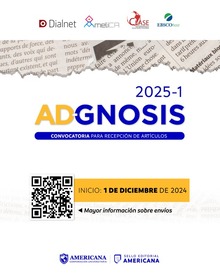Productivity of Coltrans Barranquilla workers considering the incidence of leadership during Covid-19
DOI:
https://doi.org/10.21803/adgnosis.13.13.699Keywords:
Productivity, Leadership , Collaborators, Work Teams, PerformanceAbstract
i) introduction: the absence of good leadership is directly reflected in the motivation, communication, work environment and performance of the employees of a company, in a negative way; ii) objective: to determine the impact of leadership on the productivity of employees of the company Coltrans Barranquilla during the period of the pandemic; iii) methodology: the approach of this study responds to a quantitative research with descriptive scope. A survey type questionnaire was used with answers in Likert scale, to a sample of 21 participants, whose answers were anonymous; iv) Results: it was identified that the company Coltrans, in spite of having a strong infrastructure and offering labor stability, presents problems with the leadership in each of its areas, therefore, a lack of recognition and strengthening of the work teams was found, leading them to a high level of desertion; v) conclusions: the role of leadership in organizations can be the difference between performance, labor welfare and productivity of the company, especially in times of contingencies such as what was experienced during covid-19.
Downloads
References
Amankwah-Amoah, J., Khan, Z., Wood, G., & Knight, G. (2021). COVID-19 and digitalization: The great acceleration. Journal of Business Research, 136, 602–611. https://doi.org/10.1016/j.jbusres.2021.08.011
Amini, A., Dorri, R., & Ahmadi, M. (2022). Identifying Factors Affecting Teleworking Productivity During COVID-19 Pandemic Using Fuzzy Techniques. Journal of Productivity Management, 16(61), 101–138. https://doi.org/10.30495/QJOPM.2022. 1938636.3213
Balk, W., Olshfski, D., Epstein, P., & Holzer, M. (1991). Perspectives on Productivity. Public Productivity & Management Review, 15(2), 265. https://doi.org/10.2307/3380770
Bushe, G. R., & Lewis, S. (2023). Three change strategies in organization development: data-based, high engagement and generative. Leadership and Organization Development Journal, 44(2), 173–188. https://doi.org/10.1108/LODJ-05-2022-0229
Caldwell, C., Ichiho, R., & Anderson, V. (2017). Understanding level 5 leaders: the ethical perspectives of leadership humility. Journal of Management Development, 36(5), 724–732. https://doi.org/10.1108/JMD-09-2016-0184
Catană, S.-A., Toma, S.-G., Imbrişcă, C., & Burcea, M. (2022). Teleworking Impact on Wellbeing and Productivity: A Cluster Analysis of the Romanian Graduate Employees. Frontiers in Psychology, 13, 1–13. https://doi.org/https://doi.org/10.3389/fpsyg.2022.856196
Charalampous, M., Grant, C. A., Tramontano, C., & Michailidis, E. (2019). Systematically reviewing remote e-workers’ well-being at work: a multidimensional approach. European Journal of Work and Organizational Psychology, 28(1), 51–73. https://doi.org/10.1080/1359432X.2018.1541886
Collins, J. (2001). Level 5 Leadership: The Triumph of Humility and Fierce Resolve. Harvard Business Review, 66–76. http://0-eds.a.ebscohost.com.pugwash.lib.warwick.ac.uk/eds/detail/detail?sid=7b9dbab0-f7e2-4096-a5eb-ed92485d8c29%40sessionmgr4007&vid=0&hid=4210&bdata=JnNpdGU9ZWRzLWxpdmU%3D#AN=17602072&db=bth
Contreras, F., Baykal, E., & Abid, G. (2020). E-Leadership and Teleworking in Times of COVID-19 and Beyond: What We Know and Where Do We Go. Frontiers in Psychology, 11, 1–11. https://doi.org/10.3389/fpsyg.2020.590271
da Cruz, M., Nunes, A., & Pinheiro, P. (2011). Fiedler’s Contingency Theory: Practical Application of the Least Preferred Coworker ( LPC ) Scale. IUP Journal of Organizational Behavior, 10(4), 7–26.
de Oliveira, C., Saka, M., Bone, L., & Jacobs, R. (2023). The Role of Mental Health on Workplace Productivity: A Critical Review of the Literature. Applied Health Economics and Health Policy, 21(2), 167–193. https://doi.org/10.1007/s40258-022-00761-w
García-Salirrosas, E. E., & Millones-Liza, D. Y. (2023). Aceptación de la tecnología y su relación con el desempeño laboral de los teletrabajadores. Revista Venezolana de Gerencia, 28(9 Especial), 199–214. https://doi.org/10.52080/rvgluz.28.e9.13
Hurtado de Barrera, J. (2000). Metodologia de la Investigación Holística (3rd ed.). Sypal & Instituto Universitario de Tecnología Caripito. https://ayudacontextos.files.wordpress.com/2018/04/jacqueline-hurtado-de-barrera-metodologia-de-investigacion-holistica.pdf
Ketudat, S., & Jeenanunta, C. (2021). Impact of the COVID-19 pandemic on logistics firms and their resilience: Case studies in Thailand. Engineering Management in Production and Services, 13(3), 86–98. https://doi.org/10.2478/emj-2021-0023
Kilag, O., Tiongzon, B., Paragoso, S., Ompad, E., Bibon, M., Alvez, G., & Sasan, J. (2023). HIGH COMMITMENT WORK SYSTEM AND DISTRIBUTIVE LEADERSHIP ON EMPLOYEE PRODUCTIVE BEHAVIOR. International Journal of Economy and Innovation, 36, 389–409. https://www.gospodarkainnowacje-pl.openconference.us/index.php/issue_view_32/article/view/1587/1487
Lorenzo, E. (2018). La Productividad Laboral y Competencia Laboral de los servidores públicos de la Dirección General de Formación Profesional y Capacitación Laboral del MTPE – Lima, 2017 [Universidad César Vallejo]. https://repositorio.ucv.edu.pe/bitstream/handle/20.500.12692/23150/LORENZO_GEP.pdf?sequence=1&isAllowed=y#:~:text=Los autores Robbins y Judge,de eficacia como de eficiencia.
Manciati-Alarcón, R. X. (2021). Impulso Social y Empresarial en Época de Pandemia. Economía y Negocios, 12(2), 116–121. https://doi.org/10.29019/eyn.v12i2.973
Mayer, C., Sivatheerthan, T., Mütze-Niewöhner, S., & Nitsch, V. (2023). Sharing leadership behaviors in virtual teams: effects of shared leadership behaviors on team member satisfaction and productivity. Team Performance Management, 29(1–2), 90–112. https://doi.org/10.1108/TPM-07-2022-0054
Mayo, E. (2004). The Human Problems Of An Industrial Civilization (1st Editio, Vol. 6). Routledge. https://doi.org/10.4324/9780203487273
Mayo, E. (2014). The social problems of an industrial civilisation: With an appendix on the political problem. The Social Problems of an Industrial Civilisation: With an Appendix on the Political Problem, 1–148. https://doi.org/10.4324/9781315824277
Mondragon, D. (2017). Administración de Empresas (Primera). Fondo editorial Areandino. https://digitk.areandina.edu.co/bitstream/handle/areandina/1195/Administración de Empresas.pdf?sequence=1&isAllowed=y
Newstrom, J. W. (2007). Organizational Behavior Human Behavior at Work (12th editi). McGraw-Hill Education.
Parsoya, S., & Perwej, A. (2021). The impacts of Covid-19 Pandemic on Businesses and Economies: Global Perspectives. Journal of Internarional Business and Economy, 22(1), 109–126. https://doi.org/10.5281/zenodo.5668067
Prasada, K. D. V., Vaidyab, R. W., & Mangipudic, M. R. (2020). Effect of occupational stress and remote working on psychological well-being of employees: an empirical analysis during covid-19 pandemic concerning information technology industry in hyderabad. Indian Journal of Commerce & Management Studies, XI(2), 1–13. https://doi.org/10.18843/ijcms/v11i2/01
Romero, J. C. (2022). Negocios y tecnología: los partidarios para generar competitividad empresarial [Universidad De La Salle]. In Ciencia Unisalles. https://ciencia.lasalle.edu.co/negocios_relaciones/274
Schriesheim, C., & Klich, N. (1987). Fiedler’s Least Preferred Coworker (LPC) Instrument: An Investigation of its True Bipolarity. Hispanic Journal of Behavioral Sciences, 9(2), 305. http://hjb.sagepub.com.proxy.lib.umich.edu/content/9/2/183.full.pdf+html
Sharma, P., Leung, T. Y., Kingshott, R. P. J., Davcik, N. S., & Cardinali, S. (2020). Managing uncertainty during a global pandemic: An international business perspective. Journal of Business Research, 116, 188–192. https://doi.org/10.1016/j.jbusres.2020.05.026
Stoker, J. I., Garretsen, H., & Lammers, J. (2022). Leading and Working From Home in Times of COVID-19: On the Perceived Changes in Leadership Behaviors. Journal of Leadership and Organizational Studies, 29(2), 208–218. https://doi.org/10.1177/15480518211007452
Tafvelin, S., Lundmark, R., von Thiele Schwarz, U., & Stenling, A. (2023). Why do leaders engage in destructive behaviours? The role of leaders’ working environment and stress. Journal of Occupational and Organizational Psychology, 96(1), 165–181. https://doi.org/10.1111/joop.12413
Velásquez, A., & Martínez, J. (2021). Factores de la reingeniería de negocios en tiempos de COVID-19. Revista Especializada de Ingeniería y Ciencias de La Tierra, 1(1), 90–103. https://revistas.up.ac.pa/index.php/REICT
Verkerk, P. (1990). FIEDLER’S CONTINGENCY MODEL OF LEADERSHIP EFFECTIVENESS: BACKGROUND AND RECENT DEVELOPMENTS. Eindhoven University of Technology, 90(02), 1–24.
Voordt, T. van der, & Jensen, P. A. (2023). The impact of healthy workplaces on employee satisfaction, productivity and costs. Journal of Corporate Real Estate, 25(1), 29–49. https://doi.org/10.1108/JCRE-03-2021-0012
Wahyudi, L., Panjaitan, H., & Junaedi, A. (2023). Leadership Style, Motivation, and Work Environment on Job Satisfaction and Employee Performance at the Environment and Hygiene Department of Pekanbaru City. Journal of Applied Business and Technology, 4(1), 55–66. https://doi.org/10.35145/jabt.v4i1.119
Weber, C., Golding, S. E., Yarker, J., Lewis, R., Ratcliffe, E., Munir, F., Wheele, T. P., Häne, E., & Windlinger, L. (2022). Future Teleworking Inclinations Post-COVID-19: Examining the Role of Teleworking Conditions and Perceived Productivity. Frontiers in Psychology, 13, 1–17. https://doi.org/10.3389/fpsyg.2022.863197

Downloads
Published
Issue
Section
License
Copyright (c) 2024 AD-GNOSIS

This work is licensed under a Creative Commons Attribution-NonCommercial-NoDerivatives 4.0 International License.





